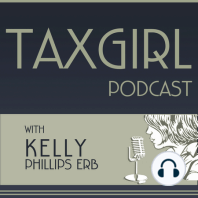34 min listen
58: Financial Psychology: How the Mind Influences Money Management
FromTaxgirl Podcast
ratings:
Length:
46 minutes
Released:
Aug 17, 2021
Format:
Podcast episode
Description
As we come out of the pandemic, many taxpayers find that they are not in the same financial situation as they were before. Some lost jobs or businesses, while others took on extra debt. Many of the expenses, from healthcare to mortgage payments, remained on the table, even if they were delayed or deferred. Now that we seem to be turning a corner, it’s time to talk about paying down debt, saving money, and planning next steps. In the wake of a global pandemic, changing your money management strategy can feel daunting. Today’s guest is an expert in financial psychology and teaches financial literacy. On today’s episode of the Taxgirl podcast, Kelly is joined by Jacquette Timmons to chat about how we can change our mindset and decision-making around money. Jacquette focuses on the “human side” of money in the field of financial psychology. As a financial behaviorist, she believes “you don’t manage money, you manage your choices around money.” On top of being an author and frequent blogger, Jacquette is also the creator of Pricing Made Human, and The Comfort Circle, a dinner series where she hosts sessions about money, business, psychology, and life, over food and wine. She is also the host of the podcast More Than Money. Listen to Kelly and Jacquette talk about money management and financial literacy: Debt, child tax credit, and financial obligations in the wake of the pandemic: how can families have confidence in their money management during the rest of 2021 and beyond? What should people think about when they’re getting an additional check this year with the child tax credit? There’s a lot of judgmental attitudes out there based on how folks talk about their money or spend their money. How can tax and finance professionals work to further understand financial psychology, without placing judgment on those families for the way they spend? What keeps people from talking about money when there’s sometimes a stigma around certain spending patterns? Jacquette talks about how financial literacy and decision making are like muscles, and it takes practice and openness to find a healthy balance. Jacquette says it’s important to have “a willingness to experiment” with the way you handle your money and finances, but that can be difficult when you’re deeply overwhelmed by your financial circumstances. How can you work on shifting your mindset toward money management during times of financial stress? Small and consistent changes can have a “profound” impact on both results and the new habits you’re creating around your finances. It doesn’t happen overnight, and a lot of the changes happen in the mind; practice working on small, incremental changes and focus on the long term to flex your financial psychology knowledge. What is the harm with the popularized “coffee” analogy around saving money? Kelly and Jacquette discuss how restrictive examples like this can be, and what some more useful examples would be for making many small investments over time. What’s the best strategy for paying off debt? Jacquette says to work on paying down a little at a time with consistency, and paying off the smallest sum first, even if it sounds counterintuitive. At the same time, she suggests investing or saving a small amount every month at the same time to see a bit of growth while you’re paying off debt. Something that comes up often in talks of financial literacy is the idea of prioritizing debt. If you owe five different creditors, where do you start if, hypothetically, every sum was equal? Jacquette says to list everything out by category: loans, tax debt, mortgage or car, credit debt, etc. And then, she explains how to sort those debts into her “debt matrix.” In the lives of families or the health of small businesses, in many cases finances are tighter than they were before the pandemic. Kelly and Jacquette discuss how this can have an impact...
Released:
Aug 17, 2021
Format:
Podcast episode
Titles in the series (90)
5: Following The Money: All About IRS Criminal Investigation by Taxgirl Podcast
